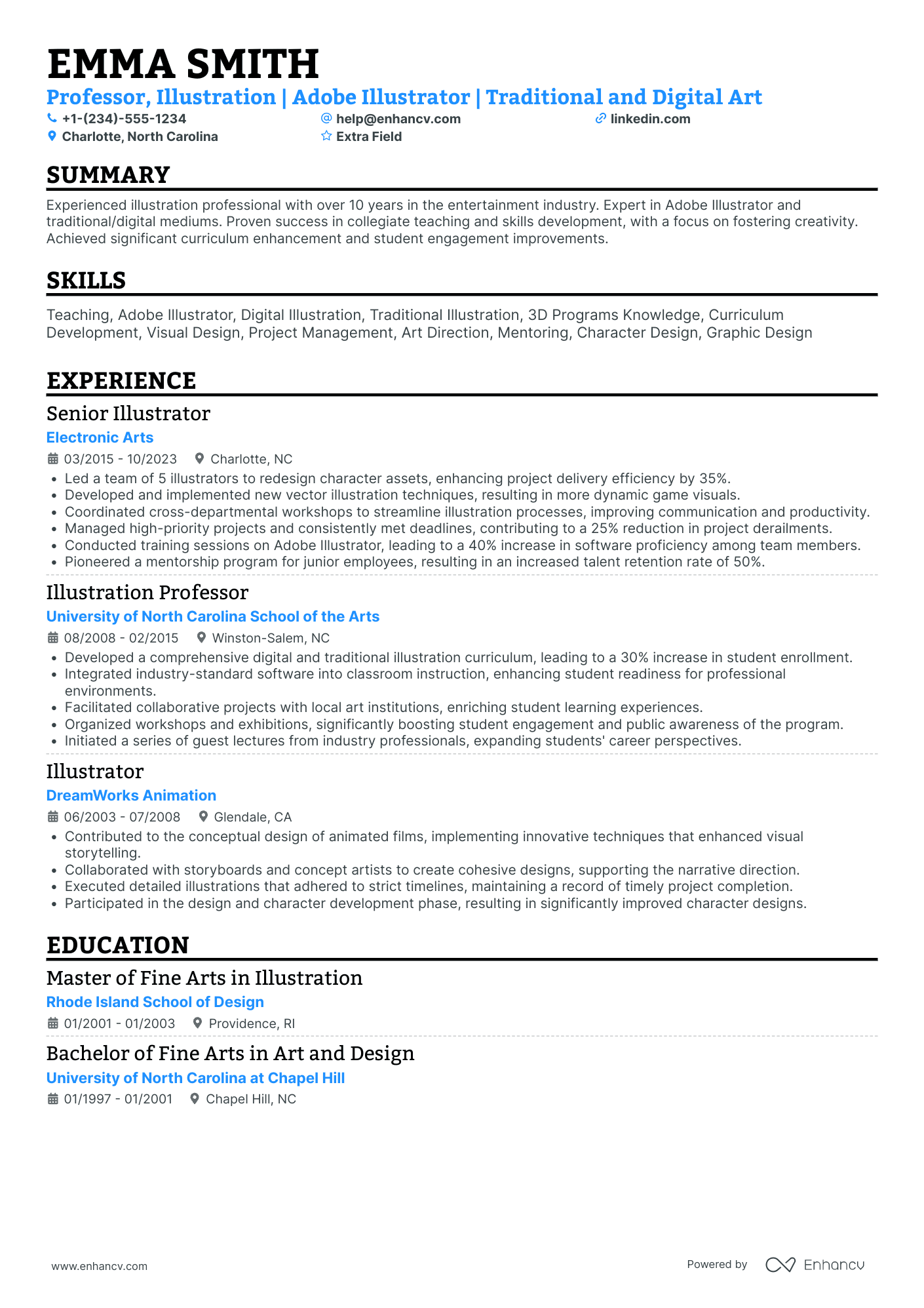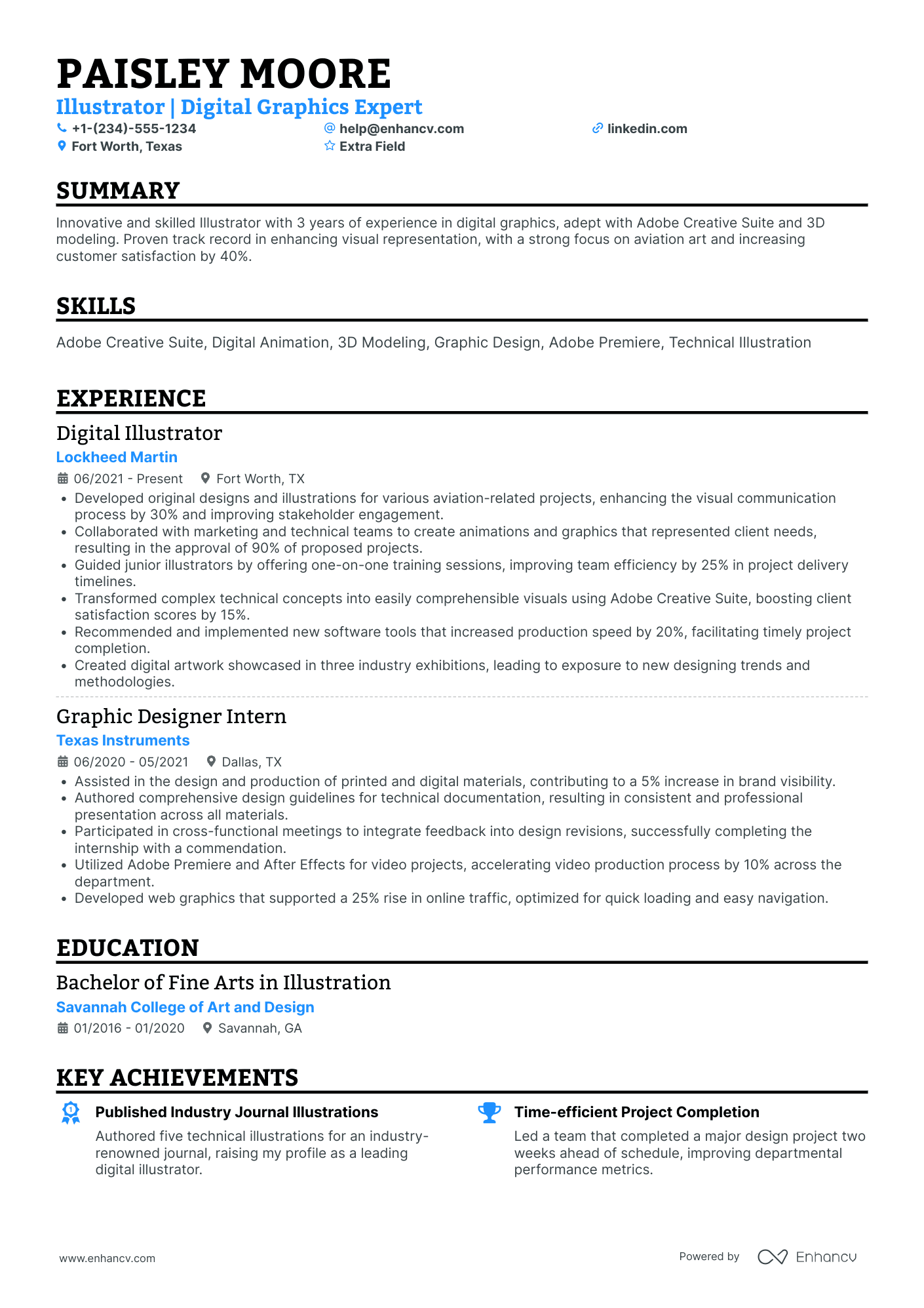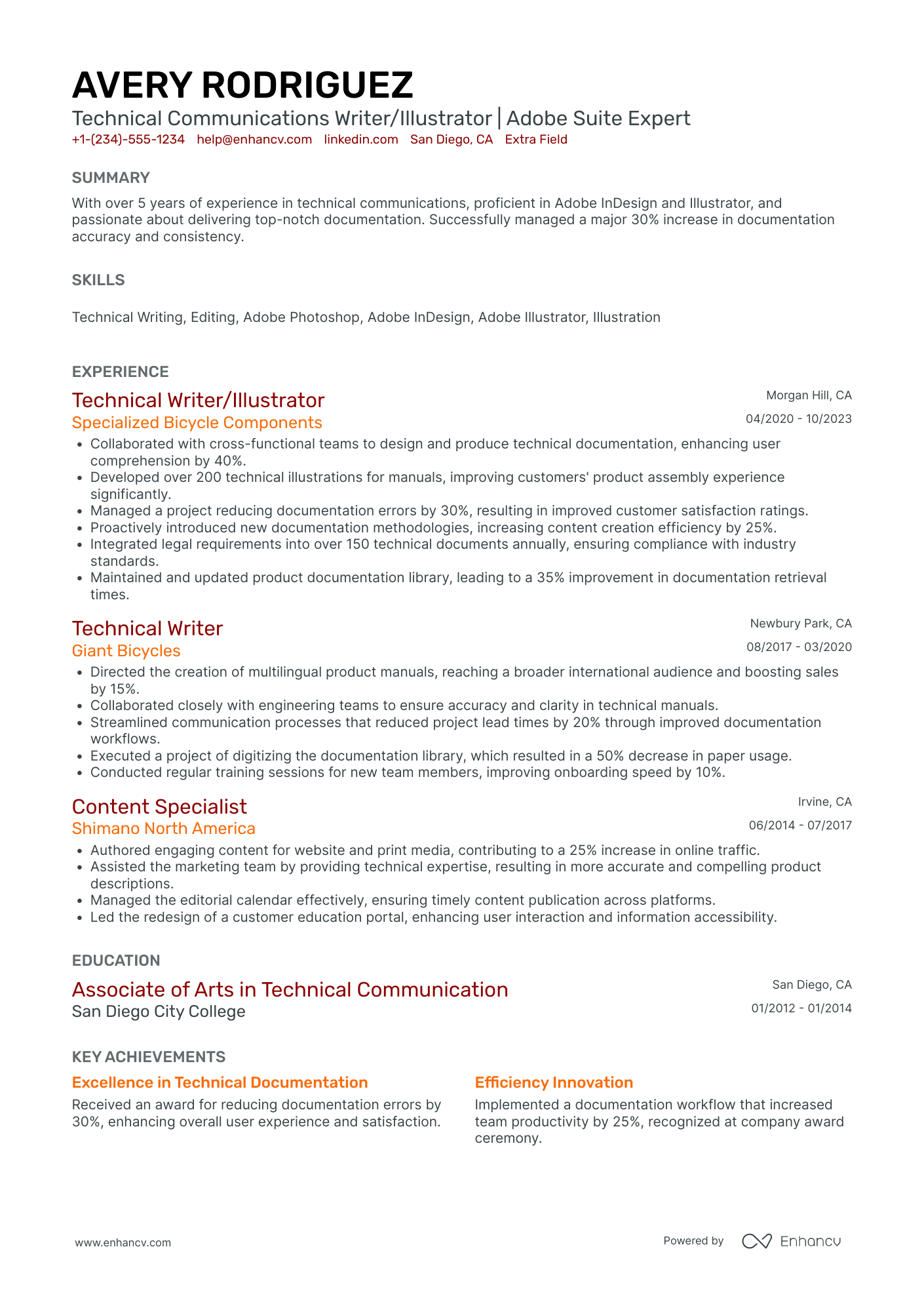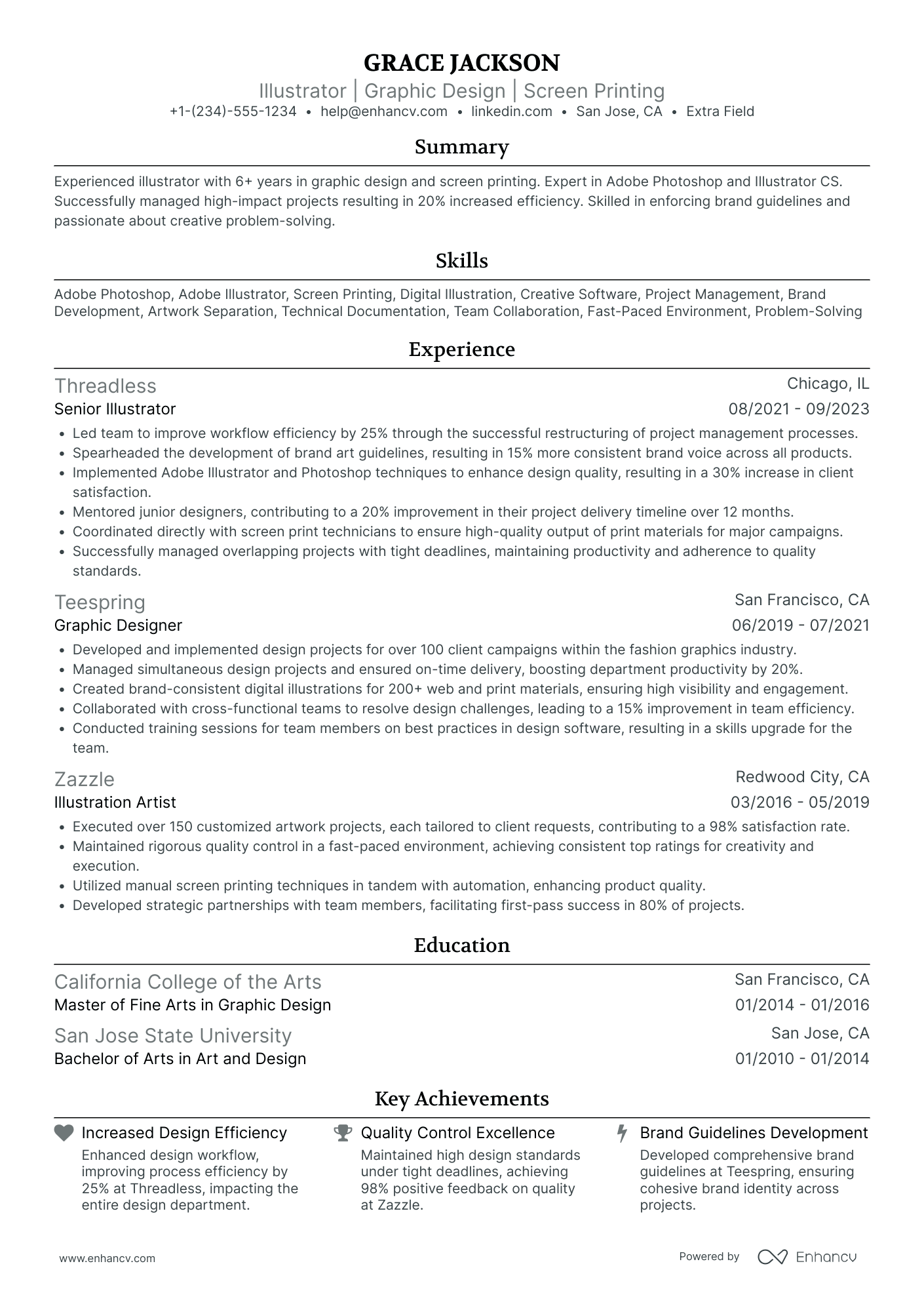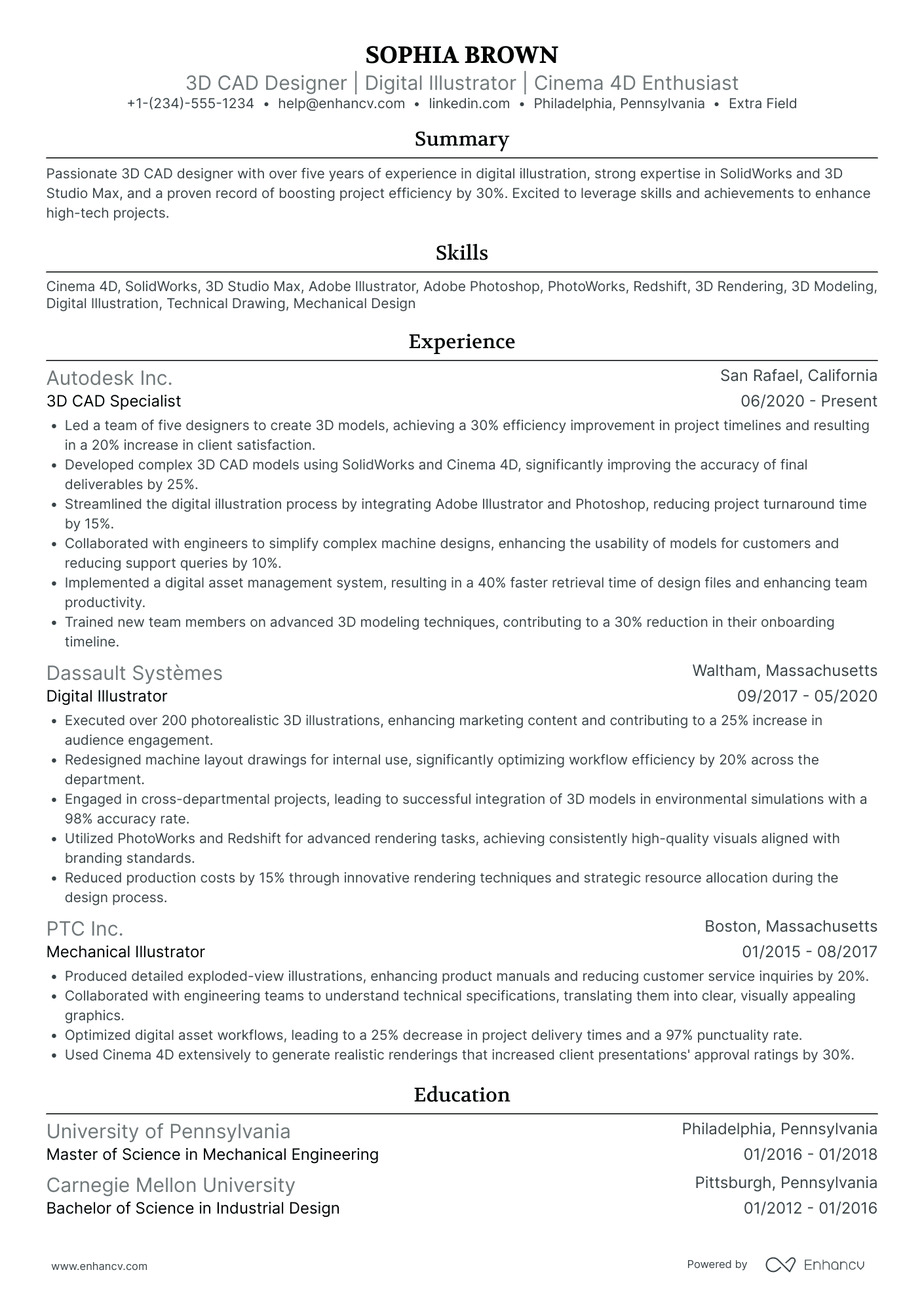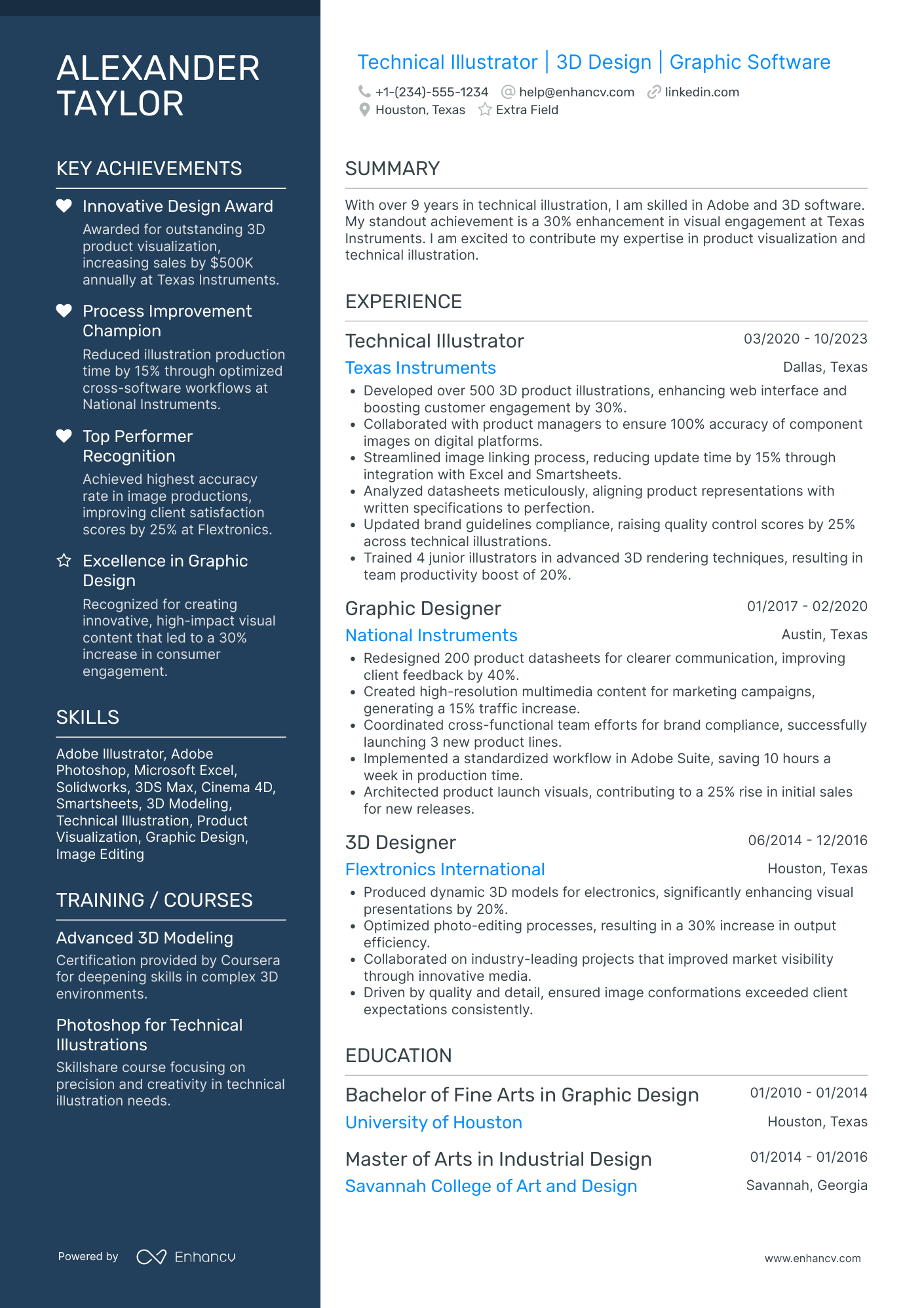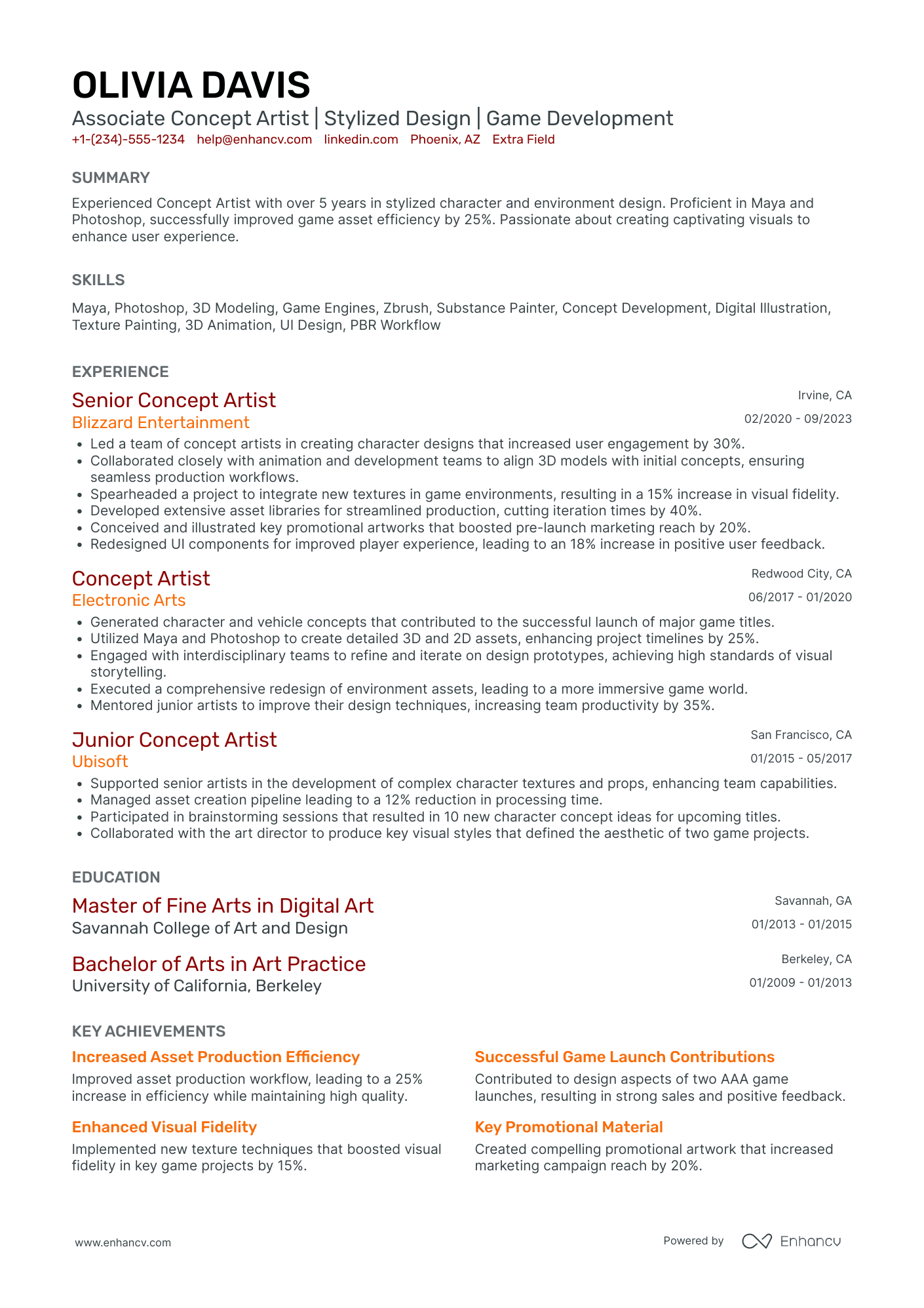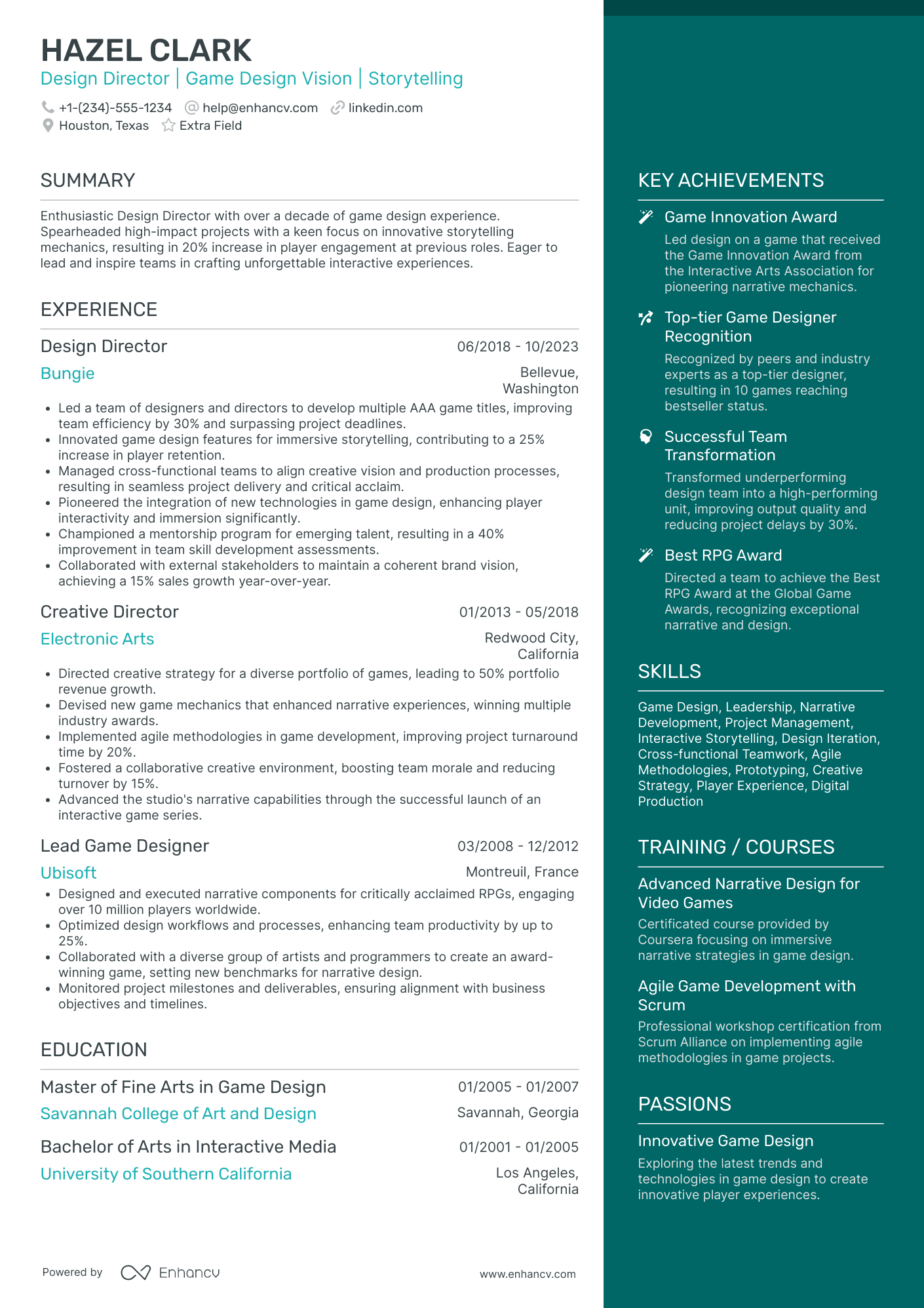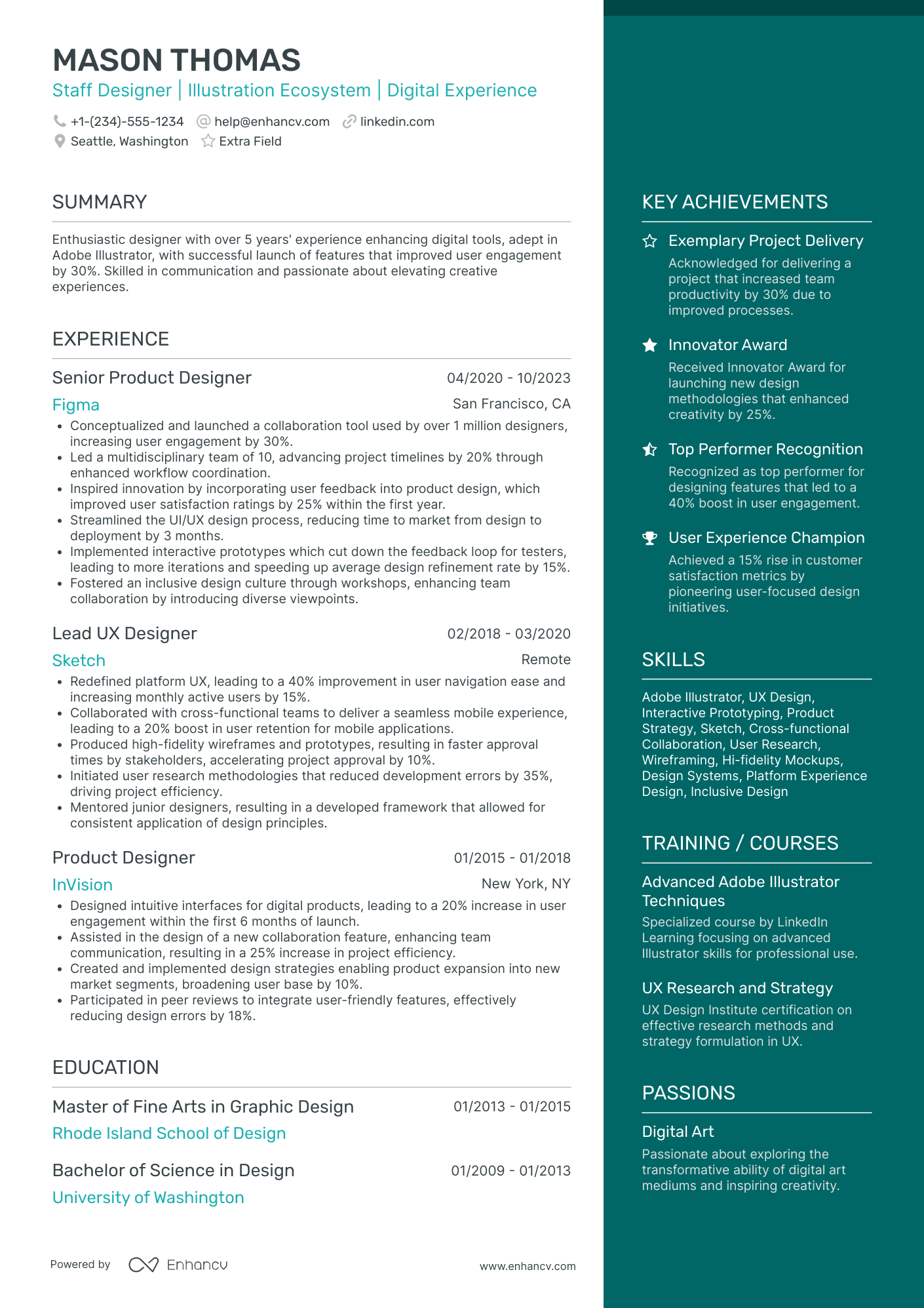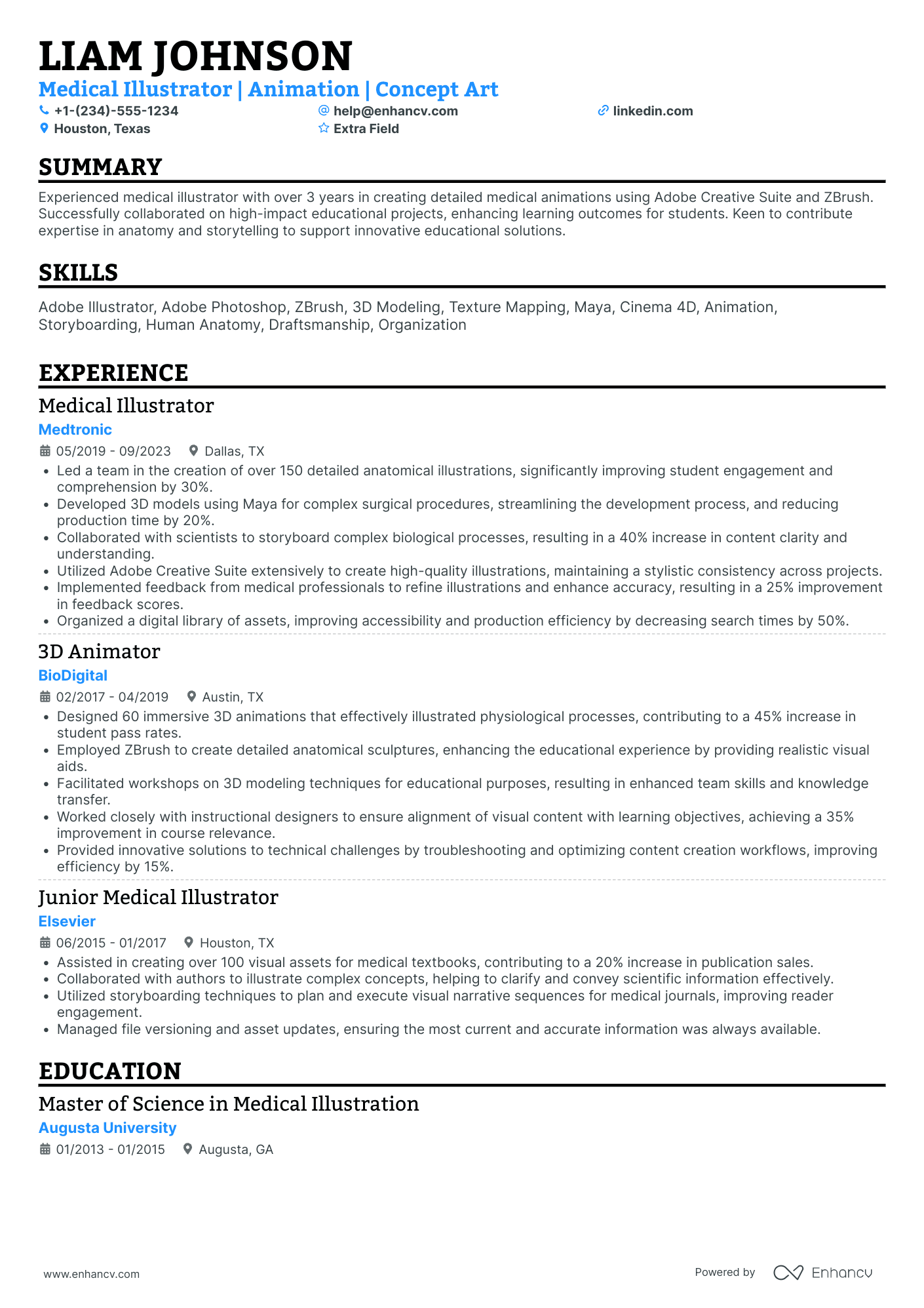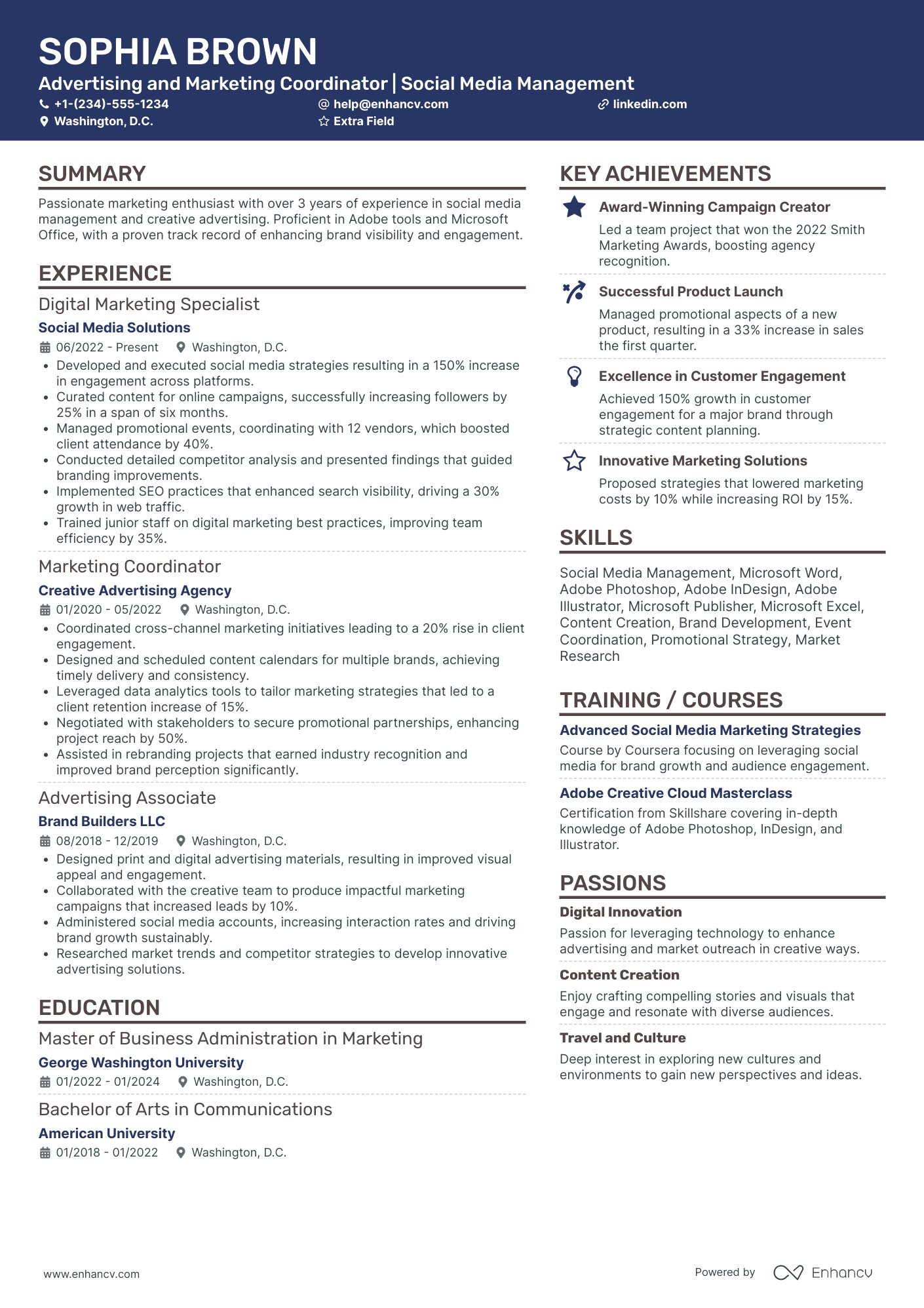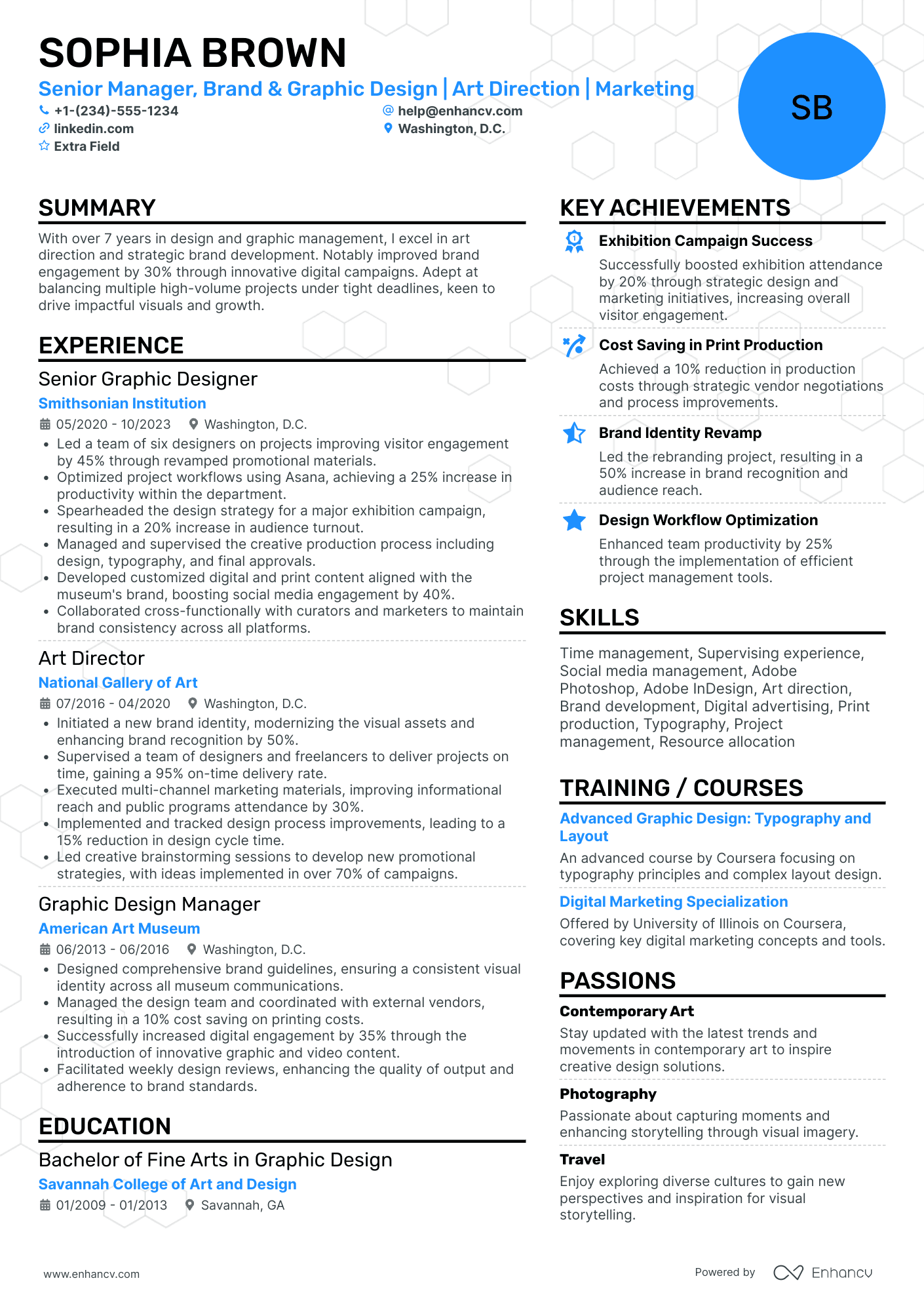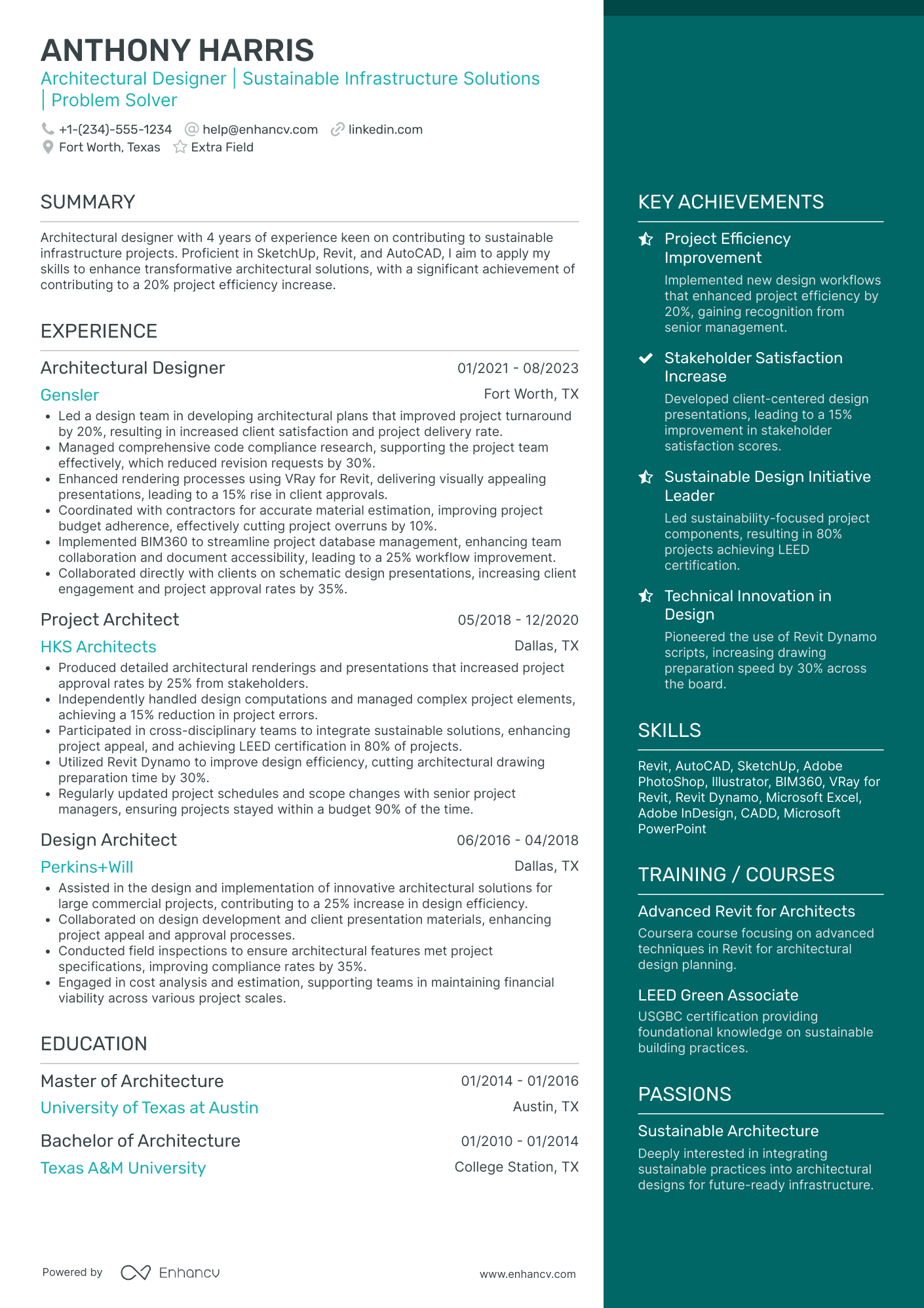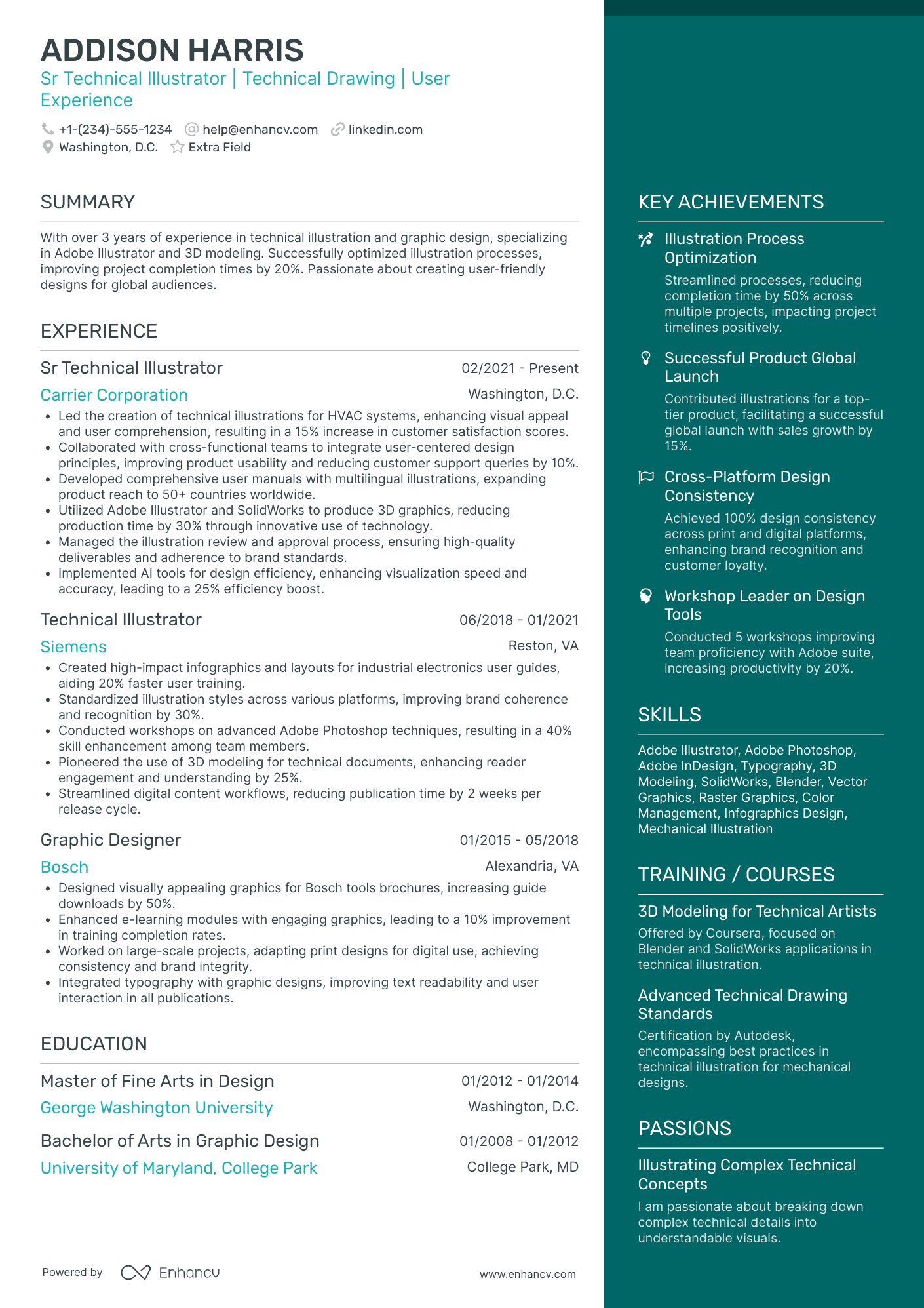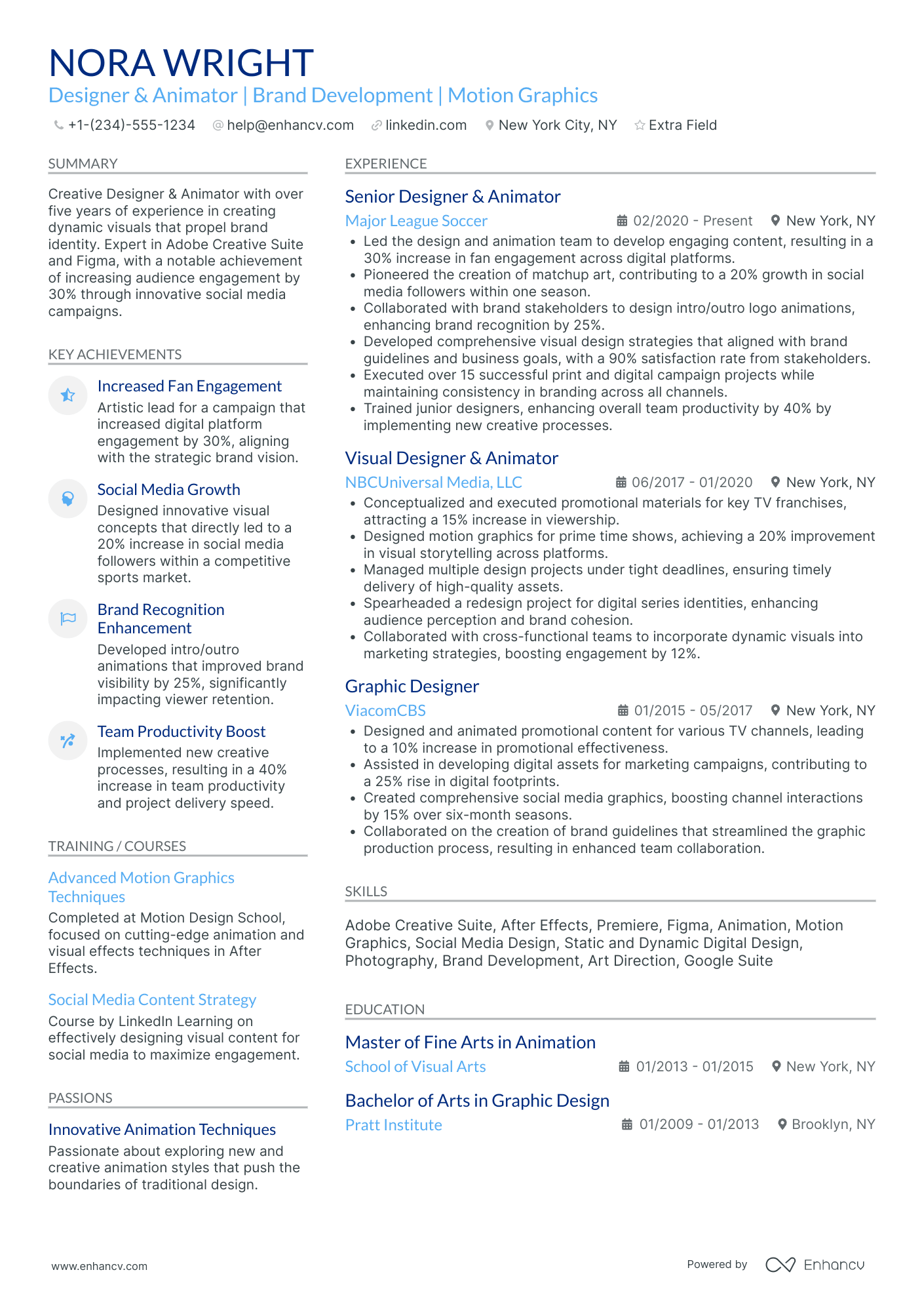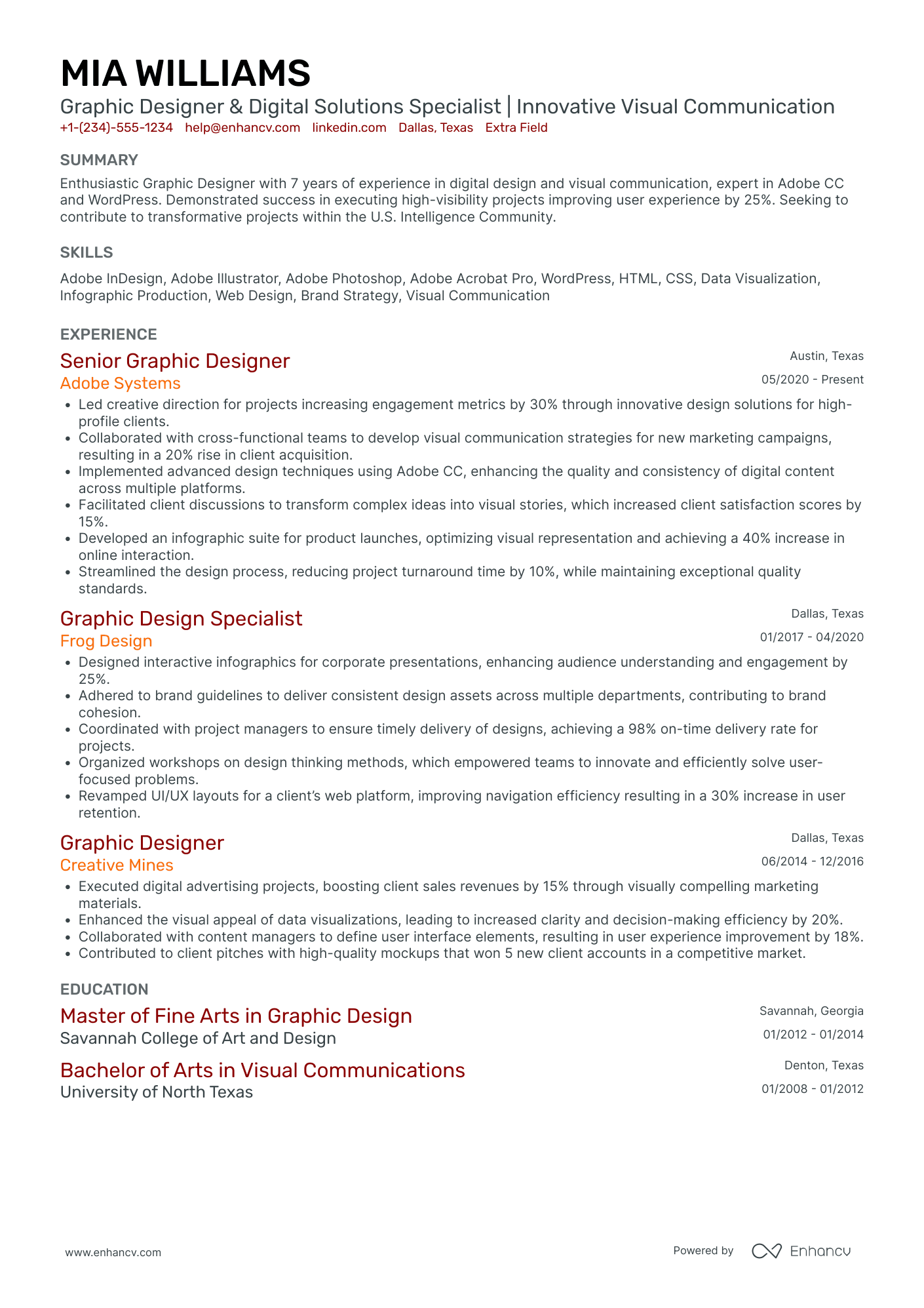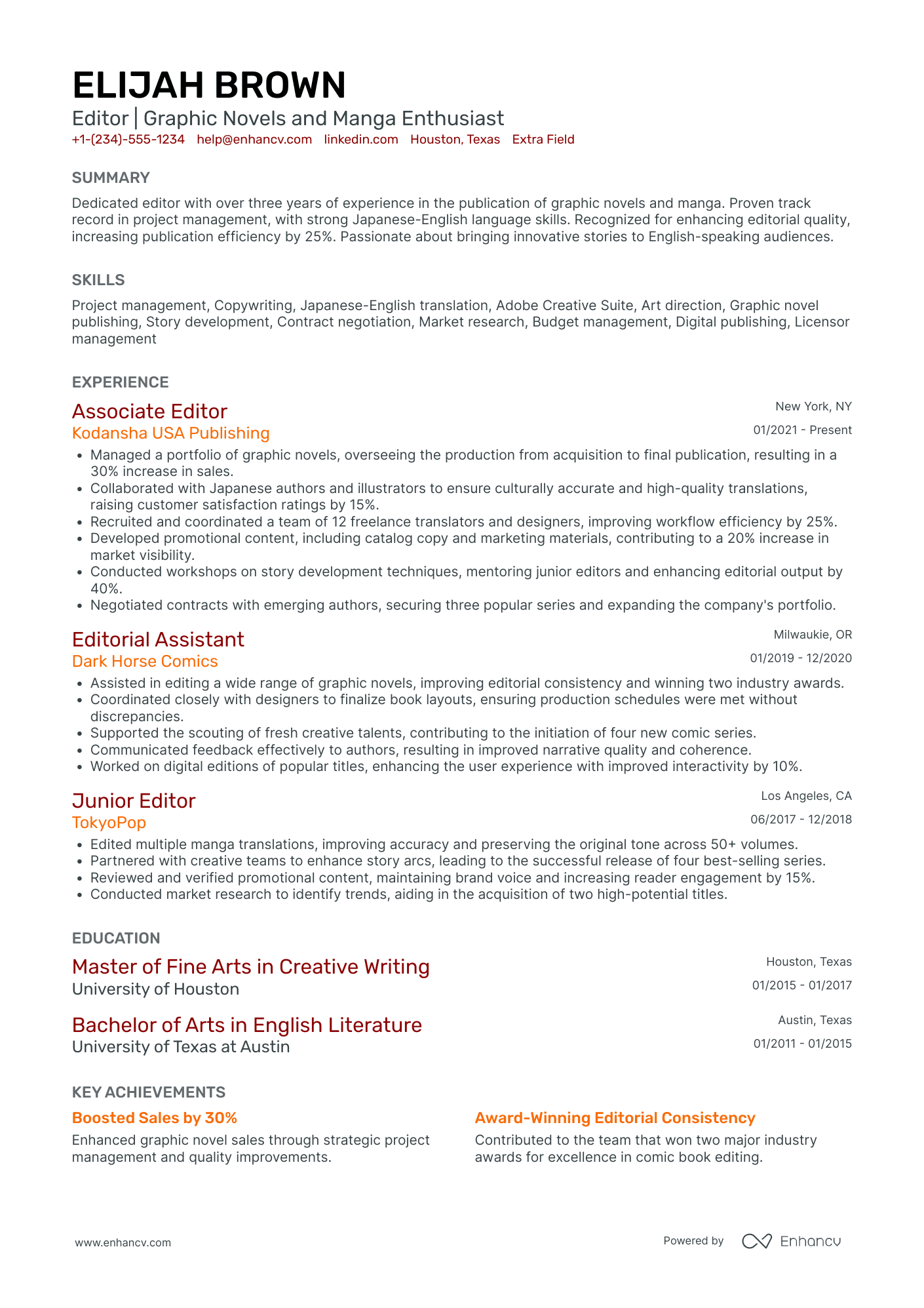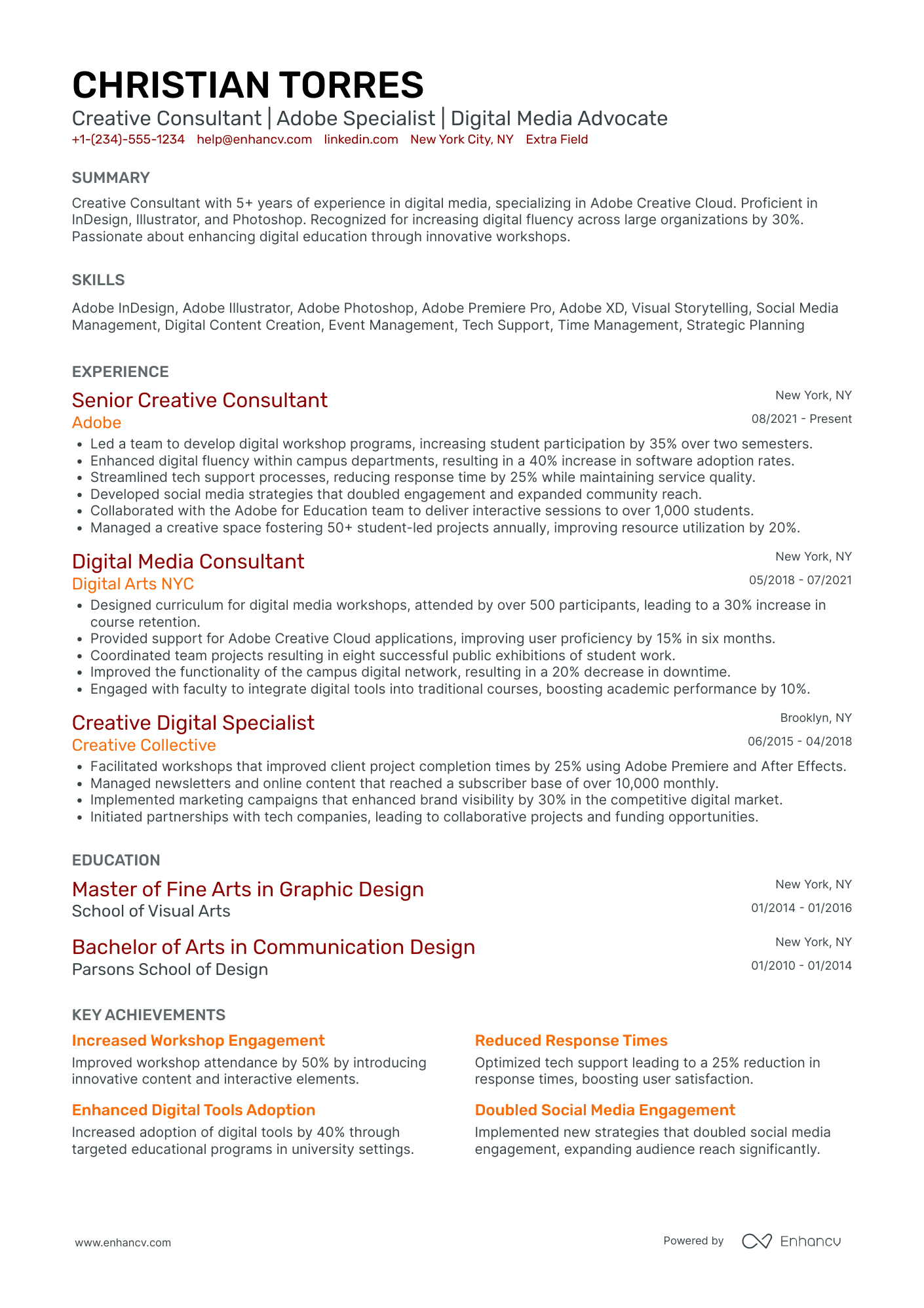With the expansion of freelance work and the rise of AI-generated images, illustrators are facing unprecedented challenges. Balancing creative freedom with job security has become increasingly difficult, and platforms like Midjourney are transforming the industry by offering speed and lower costs. Illustrators must find ways to demonstrate their value beyond what automation can provide.
In such a rapidly shifting industry, one thing remains essential: a well-crafted resume. Whether you’re an emerging illustrator seeking your first clients or a seasoned professional aiming to establish your authority, your resume needs to highlight your unique strengths and versatility. Pair it with a polished portfolio to ensure you remain competitive in this evolving field.
Key takeaways
- The combination resume format balances your skills and experience, giving you a well-rounded application that showcases both.
- Infuse creativity into your resume design, but ensure it’s professional and readable to capture attention while demonstrating your artistic flair.
- Tailor your resume to the job posting and focus on your strengths, whether you're just starting or have years of experience in the field.
- Dedicate a section to your hard skills, while weaving your soft skills into your resume summary and experience descriptions for a more holistic view of your abilities.
- Choose a resume summary if you’re experienced, or an objective if you're just starting out, to make your career goals clear from the get-go.
- Optional sections, like awards or side projects, represent your individuality.
Let’s paint a clearer picture with a practical resume sample.
Illustrator resume sample
Check out Marcus’ resume. It blends his experience as an in-house and freelance illustrator. Copy and paste your details directly in the template or create your own within minutes, with the Enhancv resume builder.
Marcus Hall
Creative Lead Illustrator | Expert in Visual Storytelling & Digital Design
(501) 555-12xx | marcus.hall@enhancv.com | @LinkedIn | Little Rock, AR
Summary
Creative and detail-oriented Illustrator with over five years of experience in developing visually appealing illustrations for various clients. Proficient in both traditional hand-drawing and digital tools, with a strong ability to understand and translate client needs into engaging two-dimensional imagery. Adept at managing projects from concept to completion, negotiating budgets, and meeting tight deadlines without compromising quality. Passionate about bringing stories and concepts to life through art.
Experience
Lead Illustrator
Creative Minds Agency, Little Rock, AR
June 2021 – Present
- Meet with clients to define their artistic vision and project objectives, resulting in over 50 successful client partnerships.
- Develop rough drafts and final illustrations for print and digital mediums, adhering to client requirements and maintaining quality standards.
- Collaborate with marketing and design teams to integrate illustrations into branding campaigns, improving overall client brand recognition.
- Rework and refine illustrations per client feedback, maintaining a high satisfaction rate of 95%.
- Manage project budgets and negotiate pricing, ensuring profitability while meeting client expectations.
- Ensure project deadlines are met by effectively organizing workflow and coordinating with internal teams.
Freelance Illustrator
Independent Contractor, Little Rock, AR
August 2018 – May 2021
- Worked with various clients, including authors, small businesses, and advertising agencies, to produce customized illustrations for books, websites, and marketing materials.
- Utilized Adobe Creative Suite and traditional sketching techniques to create detailed images for diverse projects, consistently meeting client expectations.
- Brainstormed and conceptualized designs based on client ideas and feedback, resulting in strong customer retention and repeat business.
- Effectively managed multiple projects simultaneously, adhering to client deadlines and budgetary constraints.
Education
Bachelor of Fine Arts in Illustration
University of Arkansas, Fayetteville, AR
Graduated: 2018
Certifications
Adobe Certified Expert (ACE) – Adobe Illustrator (2023)
Certified Digital Artist – Skillshare (2023)
Skills
- Digital Illustration
- Adobe Creative Suite (Illustrator, Photoshop, InDesign)
- Traditional Hand-Drawn Sketching
- Visual Storytelling
- Typography
- Branding Design
- Layout and Composition
Languages
- English (Fluent)
- Spanish (Conversational)
Having reviewed an illustrator resume example, let’s focus on structuring your resume effectively.
How to format an illustrator resume
Your resume design is a way to show your artistic identity, and a creative resume does the trick. Draw inspiration from art you admire, and experiment with different options, but remember to keep it professional. You can also check out our creative resume templates for inspiration.
Top sections
Your resume sections can vary, but here are the ones you shouldn’t miss:
- Personal Information
- Summary/Objective
- Skills and Competencies
- Experience
- Work Portfolio
- Education and Certifications
Resume format
As an illustrator, your portfolio and skills are just as important—if not more so—than your professional experience. The best way to highlight both is by choosing a hybrid resume, which balances the two. This resume format allows you to emphasize your creative strengths alongside your work history.
Resume designs
While it’s tempting to let your imagination run wild, you still need to follow some classic resume conventions. Don’t worry, there’s still room for creativity.
Here are a few design tips that will help you strike the right balance:
- Keep your resume short. A one-page resume is usually enough to feature your most prominent achievements.
- Use a two-column format to organize your information. This layout is visually pleasing and helps recruiters scan your resume efficiently, just like they would scan a portfolio.
- Leave enough white space around your resume. Avoid cramping it up—use 1” margins on each side to ensure it breathes well.
- As an illustrator, you’ll know how to play colors to your advantage without overdoing it. Subtle but impactful colors enhance readability and add a touch of personality.
- Select an easy-to-read font, such as Rubik. This ensures your resume looks polished while letting your artistic side shine.
Remember, resume layouts can vary by country – for example, a Canadian resume format could look different.
Resume header
Your header should clearly present your contact information, such as your name, job title, email address, phone number, and relevant online portfolios like Behance, Dribbble, or a personal website.
You don't need to use a particular platform for your portfolio. What matters most is that it’s prominently featured in your header, making it easy for potential employers to view. This allows them to quickly see your unique style and the themes you explore, helping them assess whether your work fits their needs.
Skip the photo unless it's explicitly requested. While it's tempting to visually represent yourself, a photo can introduce bias. Focus instead on linking to a well-curated online portfolio. Depending on the company, you might add a creative avatar, though!
File formatting
The one place you don’t need to show creativity is your file name. Keep it straightforward to avoid any confusion. A popular naming convention is: FirstName_LastName_Illustrator.
We recommend using PDF to ensure your resume’s layout stays intact but always double-check the job description, as some employers may require different formats.
Now that you have an overview, why not run your resume through our AI-powered resume checker to see how it stacks up?
Is your resume good enough?
Drop your resume here or choose a file. PDF & DOCX only. Max 2MB file size.
Next, we'll detail the experiences that best illustrate your skills.
How to write your illustrator resume experience
When structuring your illustrator resume experience section, it's essential to present your skills, accomplishments, and contributions in a clear, organized way. This will reflect your unique role, whether you’re working as an in-house illustrator or doing freelance work.
Below are key points to guide you:
In-house illustrator experience section
As an in-house illustrator, your experience should emphasize how you contribute to a team and support the company’s brand and goals.
Focus on:
- Collaboration: Work with cross-functional teams like designers, marketing, and product development.
- Brand consistency: Ensure your illustrations align with and enhance the company’s brand identity across platforms.
- Project management: Show your ability to manage multiple projects with tight deadlines in a structured work environment.
- Technical skills: Highlight your proficiency with industry-standard tools (e.g., Adobe Creative Suite).
- Creative contributions: Underline your input in brainstorming and campaign development.
Freelance illustrator experience section
As a freelance illustrator, focus on presenting your versatility, independence, and client relationship management.
Illustrate your:
- Client management: Showcase your ability to understand client needs, manage expectations, and maintain strong relationships.
- Project variety: Underscore the different types of industries and projects you’ve worked on.
- Self-management: Demonstrate how you handle your schedule, budget, contracts, and deliverables independently.
- Creative adaptability: Emphasize your flexibility in delivering creative solutions across diverse client needs.
- Portfolio growth: Show how your experience has helped expand your portfolio and attract new clients.
Why resume tailoring is important
Tailoring your resume tells recruiters that you understand the specific job requirements, align with the company’s goals, stand out from generic applications, and directly address the key qualifications they seek. Use keywords from the job description to show them you’re a great fit.
Now let’s look at a real job posting. We’ve highlighted the bits we’re going to target in the entry below it.
Illustrator
Position/Company Overview
The Creative Services team works on all creative related to Rockstar Games and games publishing. This can range from creating key art and in-game art for our games to branding, merchandising, and everything in between. We work very closely with teams across all of publishing, as well as our development studios worldwide. Our illustrations are often the first thing people see on any Rockstar game, and we take great pride in creating artwork for this iconic brand. We are lovers of culture and creativity across all forms of media, and our work gives Rockstar’s products their unique look and feel from game art to stickers and special edition packaging to tattoos and giant billboards.
Responsibilities
- Develop key art images for packaging, advertising, print, and the web.
- Develop illustrations from concept and sketches to finished product.
- Closely mimic pre-existing art styles.
- Develop new art styles.
- Develop branding-based illustrations.
Qualifications
- Mastery of Photoshop.
- 5+ years of experience in a relevant field (video games, film, or book publishing).
- Passion for contemporary culture, including video games, film, and art.
Skills
- Exceptional drawing and painting skills.
- Strong knowledge of anatomy, gesture, composition, perspective, and use of color is essential.
- Exceptional and efficient sketching ability for developing illustration concepts.
- Meticulous attention to detail.
- Ability to work in and quickly adapt to a variety of art styles is essential, ranging from very graphic to photo-realistic.
Additional Information
- A portfolio is required to apply for this position.
The work history entry:
- •Led the creation of over 50 key art images for Fortnite packaging and advertising campaigns, reaching 350M+ players globally.
- •Developed original art styles for special edition merchandising projects, driving a 25% increase in collectible sales.
- •Closely mimicked existing in-game art styles for promotional assets, reducing development time by 20%.
- •Designed billboard and print campaigns that boosted brand visibility across three major regions.
- •Sketched, illustrated, and finalized concepts for limited edition game bundles, leading to a 15% increase in pre-orders.
- •Collaborated with marketing, development, and packaging teams to ensure artwork consistency across all platforms.
This entry works because it:
- Mentions key art experience for packaging, advertising, and web to match the emphasis on key art development.
- Stresses concept to finished product workflow to align with the job's requirement for full development of illustrations.
- Emphasizes mimicking pre-existing art styles to match the company’s expectation of adapting to Rockstar's iconic style.
To elevate your resume, we'll explore how to quantify your experience next.
How to quantify your experience on a resume
As an illustrator, numbers might not be the most fun for you. After all, what do they have to do with art? Still, when approaching resume writing, it’s great to have some measurable impact to support your artistic value.
Here are some ideas:
- Include time-based achievements by mentioning how your timely project completions enabled businesses to launch campaigns on schedule, leading to cost savings.
- Present statistics related to your designs, such as increased user engagement, conversion rates, or social media shares, to underline their impact.
- Highlight cost savings if your efficient use of design resources helped a business reduce material costs.
- Specify your proficiency levels with design software by quantifying them in terms of levels or percentages to reflect your hands-on experience.
- Indicate client satisfaction rates by including direct feedback or customer satisfaction scores as evidence of your success as an illustrator.
Even if you feel inexperienced, you can still put your artistic contributions into focus–explore how in the next section.
How do i write an illustrator resume with no experience
Entering the illustration field with no experience can feel intimidating, but we’ve all had to take that very first step. Many illustrators begin by building their skills through personal projects, volunteer work, or freelance gigs. The key is to focus on what you can offer—creativity, passion, and relevant skills.
Structuring your resume as a novice illustrator
- Use a functional resume format: This format emphasizes skills over work history, which is ideal if you have little to no formal experience.
- Focus on skills: List creative and technical skills such as proficiency in Adobe Creative Suite, drawing, and digital illustration.
- Include volunteer work & personal projects: Feature something like designing posters for a charity run at a local high school, or an online portfolio presenting a series of environmental-themed illustrations.
Write a strong resume objective
This brief statement that sits on top of your resume will highlight your passion for illustration and relevant skills and immediately catch the reader’s attention. Use concise sentences (no more than three), and focus on what you plan to achieve in the future.
Let’s see a resume objective example:
Moving on from writing an illustrator resume with no experience, let’s now explore how to represent your career progression clearly.
Optimize your resume summary and objective for ATS
Drop your resume here or choose a file.
PDF & DOCX only. Max 2MB file size.
Illustrator skills on your resume
For most, illustration is all about creativity and imagination, while other equally important qualities such as self-discipline and time management tend to be overlooked. In your skills section, make sure you pay enough attention to all your strengths. Your hard skills, or the abilities to work with different types of illustration software. Outline these in a separate component for better visibility.
Here are some examples:
Best hard skills for your illustrator resume
- Adobe Illustrator
- Adobe Photoshop
- CorelDraw
- Autodesk Sketchbook
- Inkscape
- Procreate
- Adobe InDesign
- Affinity Designer
- GIMP
- Sketch
- Canva
- MediBang Paint
- PaintTool SAI
- Clip Studio Paint
- Gravit Designer
- Krita
- Pixlr
- Vectr
- Blender 3D
- CINEMA 4D
Just as important are your soft skills, which are developed through your interaction with different people—not just in work, but in all areas of life. For best results, incorporate these into your experience section and use specific examples to describe them.
We recommend adding these to your illustrator resume:
Best soft skills for your illustrator resume
- Creativity
- Attention to detail
- Visual communication
- Time management
- Collaboration
- Adaptability
- Critical thinking
- Patience
- Storytelling ability
- Networking
- Self-motivation
- Problem-solving
- Ethics and integrity
- Conceptual skills
- Active listening
- Emotional intelligence
- Project management
- Stress management
- Receptiveness to feedback
- Multitasking ability
We now transition to seamlessly integrating your education and certifications.
How to list your certifications and education on your resume
Formal education isn’t usually a requirement for an illustrator, but if you have relevant degrees or training, listing them appropriately can bolster your application. Here's how to align this with employers’ expectations for creativity, mastery of tools, and knowledge of art styles.
- Clearly state your degree and major, such as Bachelor of Fine Arts (BFA) in Illustration.
- Name the educational institution to add credibility, particularly if it's a known art or design school.
- Include just the year of graduation, omitting the month for simplicity.
- If you’ve taken classes or certifications in anatomy, digital illustration, or even something less expected (like a dance class that influences gesture drawing), mention these.
- If applicable, feature being on the Dean’s List, graduating with honors (e.g., Cum Laude), or receiving any scholarships to demonstrate academic excellence.
Let’s look at an education entry targeting the job posting from above:
- •Graduated Cum Laude
- •Dean's List for four consecutive semesters
- •Received Illustration Department Scholarship
This example education section talks about relevant academic background and achievements like Dean's List and scholarships and emphasizes continuous skill development through supplementary courses. It presents key details clearly, aligning with the job ad’s focus on creativity and versatility.
Certifications on a resume
Certifications on an illustrator’s resume can often be more valuable than formal education, especially in showcasing up-to-date skills. Specialized courses in digital tools, anatomy, or specific illustration techniques demonstrate your commitment to professional growth and mastery in areas directly relevant to creative roles.
Including relevant certifications signals expertise and can give you an edge, particularly in industries like gaming or publishing where technical proficiency is essential.
Take a look at our suggestions:
Best certifications for your illustrator resume
With your qualifications layered in, let’s refine your resume summary to capture the essence of your artistic identity.
How to write your illustrator resume summary
A resume summary is a brief, impactful statement at the top of your resume that gives hiring managers an immediate sense of your qualifications and potential fit for the role. For illustrators, it should encapsulate your unique style, artistic achievements, and what you can bring to the company.
The purpose of the resume summary is to quickly convey your professional identity and how your experience, skills, and passions align with the job you're applying for. This section can help you stand out by showing what you’ve done so far and what value you offer.
Here’s an example that targets the job ad we discussed:
It’s good because it emphasizes relevant experience in video games, versatility in art styles, and collaboration with teams, aligning closely with the responsibilities and qualifications they’re seeking.
Now that we’ve got all the essential resume elements figured out, consider adding sections that further accentuate your unique creative dimensions.
Additional sections for an illustrator resume
Just like your art shows the uniqueness of your personality, optional sections on a resume can underline specific strengths, personal interests, or experiences that may set you apart from other candidates.
Here’s what to consider:
- Focus on any galleries, art shows, or public exhibitions where your work has been featured. This proves your work has been recognized and appreciated.
- Link to any books, magazines, or online publications that have featured your illustrations, showing the reach and impact of your creative work.
- Mention any notable partnerships with brands, other artists, or companies to prove your teamwork and adaptability.
- If you've used your illustration skills in a volunteer capacity, such as for non-profits or community projects, it demonstrates social responsibility and passion for the craft.
- Any awards or accolades from art competitions or professional organizations can reinforce your credibility as an illustrator.
- Showcase self-driven projects or series to point out creativity and initiative outside of professional work.
PRO TIP
If you’re a book illustrator, why not use the Book section available through our resume builder?
In conclusion
In conclusion, crafting a standout illustrator resume means showing your unique blend of creativity, skills, and career journey in a clear, engaging format. By capturing your experience, education, and optional sections like projects or awards, you can captivate employers and leave a lasting impression that sets you apart from the competition.
Illustrator resume examples
By Experience
By Role
